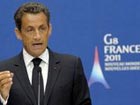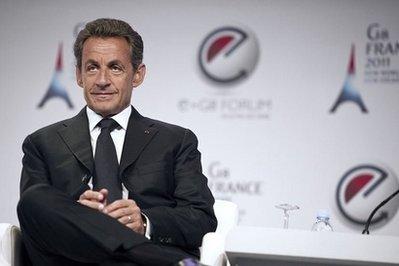| Videos | • Latest |
|
• Feature | • Sports | • Your Videos |
Sarkozy calls for greater government role on internet work

French President Nicolas Sarkozy's call for a greater government role in the workings of the Internet, have drawn both criticism and cautious praise, from industry heavyweights gathered in Paris for a pre-G8 forum.
 |
|
France's President Nicolas Sarkozy attends the e-G8 meeting gathering Internet and information technologies leaders and experts at the Tuileries gardens in Paris. |
In his opening address at the e-G8 technology forum in Paris, French President Nicolas Sarkozy made clear that he thinks governments have a role to play in fostering innovation and the digital economy, but that online businesses could not expect to operate in regulatory vacuum.
He said, "The universe that you represent is not a parallel one, free of the rule of law, free of moral and, more generally, more fundamental principles that govern social life in democratic countries. From the moment that Internet is part of the life of the majority of people, it would be a contradiction to keep governments away from this immense forum."
The gathering of tech elite, including Google's Jimmy Wales, Amazon's Jeff Bezos, and Wikipedia's Jimmy Wales, is taking place over two days in Paris, ahead of a G8 Summit.
The chairman of the e-G8 forum, Maurice Levy of Publicis Groupe, says the views expressed here will be synthesized for the political gathering in the resort town of Deauville later this week.
He said, "Obviously, there is one aspect which is very important, which is how the Internet and digital tech can accelerate growth. It is something which is very important."
However, some participants are concerned with what they see as an agenda that aims to clamp down on the Internet's freewheeling culture.
John Perry Barlow is a co-founder of the Electronic Frontier Foundation, which works to safeguard civil liberties on the net.
He said, "We've been trying to civilize cyberspace for 22 years, and I think we may have different notions of what that means. We think civilization implies liberty, implies openness, implies to the extent possible minimal regulation, and I would say that's not what this conference is about. (Why are you here?) I think it's a good idea to be present when movement is afoot to take away some of the values that you cherish."
One delegate raised the point that Skype, recently bought by Microsoft -- was started by entrepreneurs who previously ran a peer to peer file sharing service. And that YouTube, now owned by Google -- had a history of being hit by lawsuits for violating copyright laws.
The key question that's emerging is -- can governments fuel digital innovation and growth -- without harming the engine that drives it?
 0
0 







Go to Forum >>0 Comments